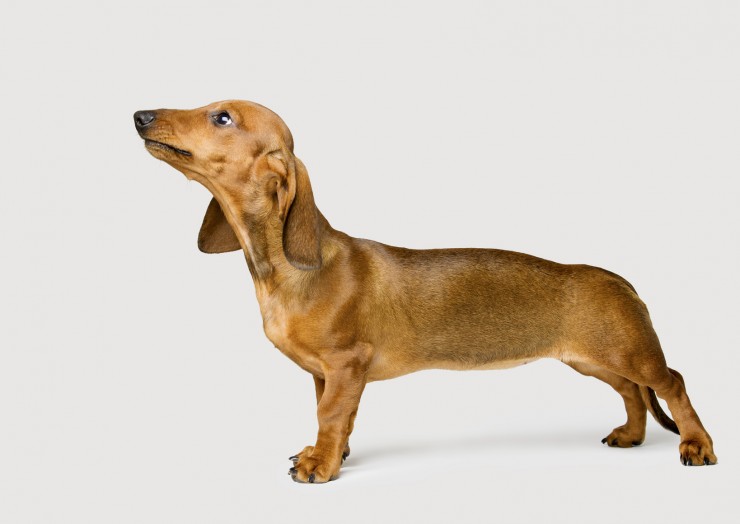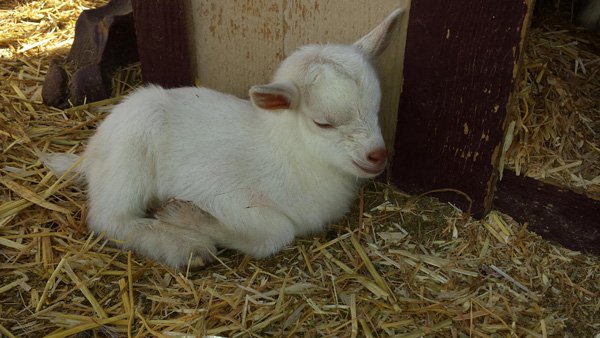

There are quite a few breeds that suffer from disc disease with Dachshunds being among the dogs most predisposed to developing the condition. Other breeds like Lhasa Apsos, Shih Tzus and Pekingese are also more at risk of suffering from chondrodystropic dwarfism which can lead to them developing all sorts of issues with their spines and more particularly from intervertebral disc problems.
The role of intervertebral discs is to act as shock absorbers between the bones found along a dog's spine. Dachshunds with their long backs often develop disc disease because the discs effectively undergo certain changes which results in them becoming harder and less flexible. The discs become more like cartilage which can then mineralise turning into a more bone-like material and it is this that causes all the problems. It's when dogs are around a year old that changes in their discs become evident and sadly, it is thought to be a natural development in the breed along with the others mentioned above. It is a degenerative condition which in short means it gets worse as time goes on.
The most commonly treated form of disc disease in Dachshunds is a condition known as "extrusion" and it's where the discs leak fluid into a dog's spinal canal. The signs to watch out for there may be a problem include the following:
It's worth noting that many Dachshunds owners often confuse a back problem with a digestive disorder because the clinical symptoms are so similar. If a dog's condition is not diagnosed early enough, they may start displaying problems moving around and often appear "wobbly" on their back legs which can lead to total paralysis if their condition is not treated as soon as possible and even then, the prognosis is not often very encouraging.
A vet's main goal would be to establish a dog's condition while at the same time ensuring they are kept as comfortable and pain free as possible. Any sort of spinal issue has to be taken very seriously and the right sort of treatment and care set in place as quickly as possible so a dog can have as much free movement as possible. A dog may always be "wobbly" on their hind legs, but they would be mobile and they would be able to go to the toilet on their own. The thing to bear in mind, is that each case is different and therefore every dog responds differently to a treatment. In short, some Dachshunds manage very well showing very little signs of there being a problem whereas others will always show some signs of a spinal problem even after they have been treated for the condition.
The good news is that a high percentage of Dachshunds with disc disease do manage to live out their lives normally as long as their condition is diagnosed and treated early enough and where they are still able to feel "deep pain sensation". However, if a dog has lost this sensation, the prognosis tends to be guarded as to whether they would recover their mobility.
Vets recommend surgery because it speeds up a dog's recovery time and it also helps control the pain a dog has to go through when suffering from any sort of disc disease. It can take as little as 2 weeks for a dog to recover although some dogs may take a little longer to get over their surgery, but this is never generally any longer than 6 weeks. If a dog's recovery takes any longer than this, then the prognosis for them making a full recovery are greatly reduced, but the good news is that only a very few dogs do not experience some degree of recovery after their surgery has been done.
If your Dachshund's condition is mild, then it may be possible to manage things without having to carry out any sort of invasive surgery. However, this would be up to the vet to determine once they have examined your dog. The procedure is quite costly which is another reason why some owners decide not to have the surgery carried out on their pets.
Dachshunds like a few other breeds, are more prone to developing some sort of disc disease during the course of their lives. Their spines undergo certain changes which sees the discs becoming less flexible and more bone-like and it's this that causes all the problems. If you suspect your Dachshund is experiencing any sort of pain and discomfort down their spine, it's really important to get them along the vet as soon as possible. The earlier disc disease is diagnosed and a treatment plan set in place, the quicker your dog would be made to feel more comfortable and the better the outcome tends to be.
 Dogs for Sale – The Places To Start Your Search
Dogs for Sale – The Places To Start Your Search
Dogs for Sale – The Places To Start Your Search
Dogs for Sale – The Places To Start Your Search
 Ten 10 Ideas For Involving Your Dog In Your Wedding, Civil Ceremony Or Vow Renewals
Ten 10 Ideas For
Ten 10 Ideas For Involving Your Dog In Your Wedding, Civil Ceremony Or Vow Renewals
Ten 10 Ideas For
 Pet Boarding Facility in Chapel Hill: Safe Heaven for Your Pet
Pet Boarding Facility in Chapel Hill: Safe Heaven for Your
Pet Boarding Facility in Chapel Hill: Safe Heaven for Your Pet
Pet Boarding Facility in Chapel Hill: Safe Heaven for Your
 Toxocara, Cats & You
Toxocara, Cats &
Toxocara, Cats & You
Toxocara, Cats &
 Cat Breeds With Cute Tufted Ears
Cat Breeds With C
Cat Breeds With Cute Tufted Ears
Cat Breeds With C
Copyright © 2005-2016 Pet Information All Rights Reserved
Contact us: www162date@outlook.com